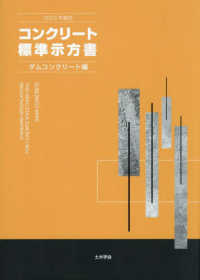- ホーム
- > 洋書
- > 英文書
- > Politics / International Relations
Full Description
Norms research in international relations has developed sufficiently over the past thirty-five years to become its own sub-discipline within the field. It has its own corresponding 'toolbox' of concepts, approaches, and methods which have often resulted from debates representing distinct perspectives on how norms matter for IR as a field and for global international relations more generally. Even so, three groups of enduring questions continue to sit at the heart of norms research: first, the processes by which norms emerge, change or disappear, on the one hand, and by which they are contested, violated, diffused, or replaced on the other; second, the agency of actors at sites on the macro-, meso-, or micro-scale of global order, and who engages with these processes; and third, the embeddedness or interaction of norms with other pre-existing norms and structures such as the prevailing rules of engagement and clusters of normative meaning.
The Oxford Handbook of Norms Research in International Relations provides a state-of-the-art overview of past, current, and future norms research in International Relations. It provides a comprehensive overview of the toolbox that has developed over this time, mapping the field's development based on key conceptual milestones, notable theoretical moves, and developments with regard to the field's contribution to social science theory development on the one hand and politics and policymaking in world politics on the other.
Contents
Front matter
Preface
Volume Editors
Section Editors
Contributors
1: Introduction
Section 1: A History of Norms Research - Section Editors: Wayne Sandholtz (University of Southern California) and Kelebogile Zvobgo (William & Mary)
2: Wayne Sandholtz (University of Southern California) and Kelebogile Zvobgo (William & Mary): The International Norms Enterprise
3: Ezgi Yildiz (California State University, Long Beach) and Isabel Silagy (Boston University): Norms, Legitimacy, and Compliance: Between International Law and Politics
4: Lucrecia García Iommi (Fairfield University) and Andrea Vilán (American University): International Norms and Domestic Politics
5: Nina Tannenwald (Brown University): The Nuclear Taboo: A Global Prohibitionary Norm
6: Audie Klotz (Syracuse University): Race and Racism in Norms Research
7: Devon Cantwell-Chavez (University of Ottawa): Whose Norms Matter? Challenging Power in Global Climate Governance
Section 2: Key Concepts of Norms ResearchSection Editors: Carmen Wunderlich (University of Freiburg) and Jeffrey S. Lantis (The College of Wooster):
8: Antje Wiener (University of Hamburg and University of Cambridge): The Norm Typology: Approaches and Models
9: Swati Srivastava (Purdue University): Hybrid Sovereignty, Norm Reification, and Practices
10: Maren Hofius (University of Hamburg): The Constructivist Promise Revisited: On the Practice Dimension of Norms
11: Carmen Wunderlich (University of Freiburg): On the Concept of Norm Clusters
12: Sassan Gholiagha (European-University Viadrina) and Mitja Sienknecht (European-University Viadrina): "It s what you ought to do: Appropriateness as a Central Concept in Norms Research
Section 3: The Methodological Tool-Kit of Norms ResearchSection Editors: Holger Niemann (Institute for Peace Research and Security Policy Hamburg) and Katharina Glaab (Norwegian University of Life Sciences):
13: 1. Katharina Glaab (Norwegian University of Life Sciences) and Holger Niemann (Institute for Peace Research and Security Policy Hamburg): How to Study International Norms: From Methodologies to Methods in Norms Research
14: Katharina Glaab (Norwegian University of Life Sciences) and Holger Niemann (Institute for Peace Research and Security Policy Hamburg): Speaking Norms: Discourse Analytical Approaches and Methodologies in Norms Research Anna Holzscheiter (TUD Dresden University of Technology)
15: Diana Panke (Free University Berlin), Ulrich Petersohn (University of Liverpool), and Sercan Pekel (University of Liverpool): Data, Generalization and Causal Inference in Quantitative Norm Research
16: Dongwook Kim (Australian National University): Quantitative Approaches and Theory Evaluation in Norms Research
17: Helen M. Kinsella (University of Minnesota) and Giovanni Mantilla (University of Cambridge): Historical Approaches and Archival Work in Norms Research Helen M. Kinsella (University of Minnesota) and Giovanni Mantilla
18: Xymena Kurowska (Central European University): Ethnographic Approaches to the Study of Norms
Section 4: Norm Emergence and ChangeSection Editors: Adam Bower (University of St Andrews) and Anette Stimmer (University of St Andrews):
19: Anette Stimmer (University of St. Andrews) and Adam Bower (University of St. Andrews): A Rhetorical Approach to Norm Change
20: Susanne Zwingel (Florida International University): Norm Translation: Content-in-Motion and Contextualized Practice
21: Jacqui True (Monash University): Transnational Network Approaches and Norm Agency
22: Kazushige Kobayashi (Ritsumeikan University Kyoto): Agents of Socialization Beyond the West
23: Anette Stimmer (University of St Andrews) and Duncan Snidal (Nuffield College, University of Oxford): How (De)Legalisation Unfolds
24: Zoltán I. Búzás (University of Notre Dame): Failed Norm Emergence and Change
Section 5: Norm Robustness: Between Strength and ErosionSection Editors: Lisbeth Zimmermann (Goethe-University of Frankfurt) and Max Lesch (Peace Research Institute Frankfurt):
25: Lisbeth Zimmermann (Goethe-University of Frankfurt) and Max Lesch (European University Institute and Peace Research Institute Frankfurt): Theories of Norm Strength and Erosion
26: Anton Peez (Goethe-University of Frankfurt): Measuring Norm Strength and Erosion in International Politics
27: Vincent Keating (University of Southern Denmark): What is the Normative Value of Norm Robustness? Comparing Constructivist and English School Perspectives
28: Ingvild Bode (University of Southern Denmark): Norm Robustness and International Practice Theories
29: Srinivas Burra (South Asian University): Norm Strength, Change, and Inequality in International Law
30: Élise Rousseau (University Cambridge): Navigating Norm Strength: Compliance Mechanisms in Global Governance
Section 6: Norms and EthicsSection Editors: Anthony F. Lang Jr. (University of St Andrews):
31: Anthony F. Lang Jr. (University of St Andrews) and Aarushi Sharma (University of St Andrews): Ethics and Normative Traditions: Peace as a Fundamental Norm
32: Neta C. Crawford (University of Oxford): Persistent Tensions Among Norms: Intention, Norms of Civilian Immunity and Protection versus Norms of Proportionality and the Military Necessity
33: Susan L. Kang (City University of New York) and Jonathan Havercroft (University of Southampton): Constructing Normative Foundations: Stanley Cavell, Social Constructivism, and Public Assembly Rights in Brazil, the U.S., and the U.K.
34: Rita Floyd (University of Birmingham): Regulating Security Policy and Practice via a Norm of Just Securitization
35: Brent Steele (University of Utah) and Eric A. Heinze (University of Oklahoma): Ethically Evaluating and Appraising Norms: Three Cautionary Tales
36: João Nunes (Universidad Pontificia Comillas Madrid): Body Politics, Domination and Vulnerability: A Critique of Global Health Security
Section 7: Norm Contestation and Normative LegitimacySection Editors: Jason Ralph (University of Leeds) and Antje Wiener (University of Hamburg and University of Cambridge):
37: Antje Wiener (University of Hamburg and University of Cambridge): Contestation Theory
38: Jason Ralph (University of Leeds): Meanings-in-Use and Useful Meanings: Norm Contestation and the Responsibility to Protect (R2P) from a Pragmatist Perspective
39: Holger Niemann (Institute for Peace Research and Security Policy Hamburg) and Henrik Schillinger (University of Duisburg-Essen): Strategies for Coping with Contestation in Norms Research
40: Chiara de Franco (University of Southern Denmark) and Linnéa Gelot (University of Southern Denmark): A Bourdieusian Perspective on Contestation Theory
41: Nicole Jenne (Pontificia Universidad Católica de Chile) and Christoph Harig (Royal Danish Defence College): Contested Peacekeeping Norms Across the Global South
42: Lucrecia García Iommi (Fairfield University): Who is Afraid of Contestation? Evaluating Norm Contestation in the Development of International Criminal Law
43: Laura von Allwörden (University of Kiel): Legitimating Norms through Contestation: The Global Climate
Section 8: Complexity, Interactions and DynamicsSection Editors: Caroline Fehl (Helmut-Schmidt-Universität/Universität der Bundeswehr Hamburg and Peace Research Institute Frankfurt), Elvira Rosert (Technische Universität Dresden), and Carla Winston (University of Melbourne):
44: Caroline Fehl (Helmut-Schmidt-Universität/Universität der Bundeswehr Hamburg and Peace Research Institute Frankfurt) and Elvira Rosert (Technische Universität Dresden): Norm Complexity and Interactions: Surveying an Emerging Field
45: Laura Gómez Mera (University of Miami): How Positive Norm Interactions Contribute to the Emergence and Diffusion of Norm Clusters
46: Johanne Døhlie Saltnes (ARENA Centre for European Studies, University of Oslo): Norm Conflicts: Distinguishing between Application and Validity
47: Ruji Auethavornpipat (La Trobe University): Norm Conflicts and Synergies in Global Migration Governance
48: Rebecca Sander (University of Cincinnati) and Laura Dudley Jenkins (University of Cincinnati) (Yale University): Normative Frameworks and Norm Hierarchies
49: Carla Winston (University of Melbourne): Norm Interactions, World Order, and Systemic Change
Section 9: Reverberations of Norms Research Across International RelationsSection Editors: Phil Orchard and Liam Moore (University of Wollongong):
50: Thomas Risse (Free University of Berlin): Deep Contestations and the Resilience of the Liberal International Order
51: Qiaochu Zhang (University of Manchester): Rising Powers as Norm Entrepreneurs and the Future of Liberal International Order
52: Liam Moore (University of Wollongong) and Phil Orchard (University of Wollongong): Reverberations Through Clusters and Regimes: Norms and Forced Displacement Policy
53: Jan Wilkens (University of Hamburg): Narratives of Change in the Climate Crisis: The Return of the Tipping Point and Critical Norms Research
54: Sara E. Davies (Griffith University): Global Health and Norms
55: Elisabeth Johansson-Nogués (Institut Barcelona d'Estudis Internacionals): Norms Research and Foreign Policy








